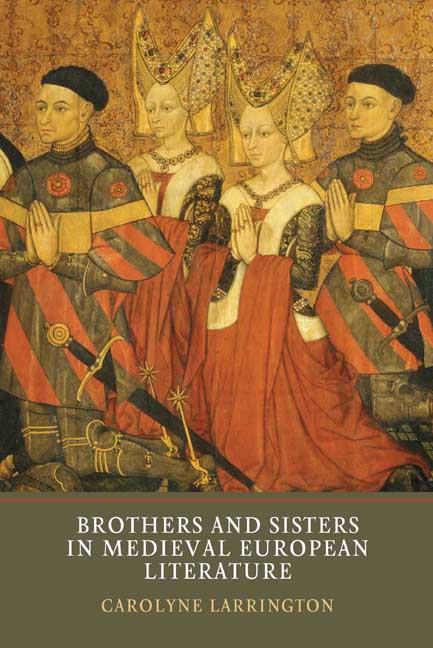Book contents
- Frontmatter
- Dedication
- Contents
- Acknowledgements
- Abbreviations
- Introduction
- 1 The Medieval Sibling in History
- 2 ‘Berr er hverr á bakinu nema sér bróður eigi’: Fraternal Love and Loyalty
- 3 ‘Io v’ho cara quanto sorella si dee avere’: Sisters, and their Brothers
- 4 ‘Næs þæt andæges nið’: Fraternal Hatreds
- 5 ‘Te souviegne de ce que je suis ta seur’: Sisters and Hostility
- 6 ‘The king’s dochter gaes wi child to her brither’: Sibling Incest
- 7 ‘So wil ich dir ce wibe mine swester gebn’: When Siblings Marry
- 8 ‘Trewethes togider that gun plight’: Fictive Siblings
- Conclusion
- Bibliography
- Index
6 - ‘The king’s dochter gaes wi child to her brither’: Sibling Incest
Published online by Cambridge University Press: 08 May 2021
- Frontmatter
- Dedication
- Contents
- Acknowledgements
- Abbreviations
- Introduction
- 1 The Medieval Sibling in History
- 2 ‘Berr er hverr á bakinu nema sér bróður eigi’: Fraternal Love and Loyalty
- 3 ‘Io v’ho cara quanto sorella si dee avere’: Sisters, and their Brothers
- 4 ‘Næs þæt andæges nið’: Fraternal Hatreds
- 5 ‘Te souviegne de ce que je suis ta seur’: Sisters and Hostility
- 6 ‘The king’s dochter gaes wi child to her brither’: Sibling Incest
- 7 ‘So wil ich dir ce wibe mine swester gebn’: When Siblings Marry
- 8 ‘Trewethes togider that gun plight’: Fictive Siblings
- Conclusion
- Bibliography
- Index
Summary
Introduction
Why should not brothers and sisters marry each other? Clearly the children of Adam and Eve must have had little choice in the matter of mates, as Augustine makes clear in his most focused discussion of sibling relationships, in De civitate Dei (The City of God). Augustine observes that at the beginning of human history men must have married their sisters:
nec essent ulli homines, nisi qui ex illis duobus nati fuissent: uiri sorores suas coniuges acceperunt; quod profecto quanto est antiquius conpellente necessitate, tanto postea factum est damnabilius religione prohibente.
(‘as there were no human beings, except those who had been born of these two [sc. Adam and Eve], men took their sisters for wives – an act which was as certainly dictated by necessity in these ancient days as afterwards it was condemned by the prohibitions of religion.’)
Once a larger population came into existence, however, brothers were enjoined to look elsewhere for wives, for, Augustine argues, one of the goods of marriage is to form new alliances, to create friendship and affection between different families. Thus to have a father and a father-in-law as one and the same person, as Adam's children did, is to lose the opportunity to bring another man into a close kin relationship. Lévi-Strauss appositely notes how the Arapesh tribe explained to Margaret Mead that a man must marry another man's sister, and give his sister in marriage, so as to acquire brothers-in-law, otherwise ‘with whom will you hunt, with whom will you garden, whom will you go to visit?’ Augustine proposes – perhaps thinking of Egyptian royal marriage customs or Greek myth – that although other religions permit brother–sister marriage, in practice it is shunned:
etiam quia nescio quo modo inest humanae ueracundiae quiddam naturale atque laudibile, ut, cui debet causa propinquitatis reuerendum honorem, ad ea contineat.
(‘there is in human nature I know not what natural and praiseworthy shamefacedness which restrains us from desiring that connection … with any one to whom consanguinity bids us render respect.’)
Although ‘human nature’, as Augustine opines, generally does shrink from brother–sister incest (and still more from same-sex incest), nevertheless medieval writers treat forbidden love between siblings, and not just as occurring problematically in the book of Genesis.
- Type
- Chapter
- Information
- Brothers and Sisters in Medieval European Literature , pp. 155 - 180Publisher: Boydell & BrewerPrint publication year: 2015



